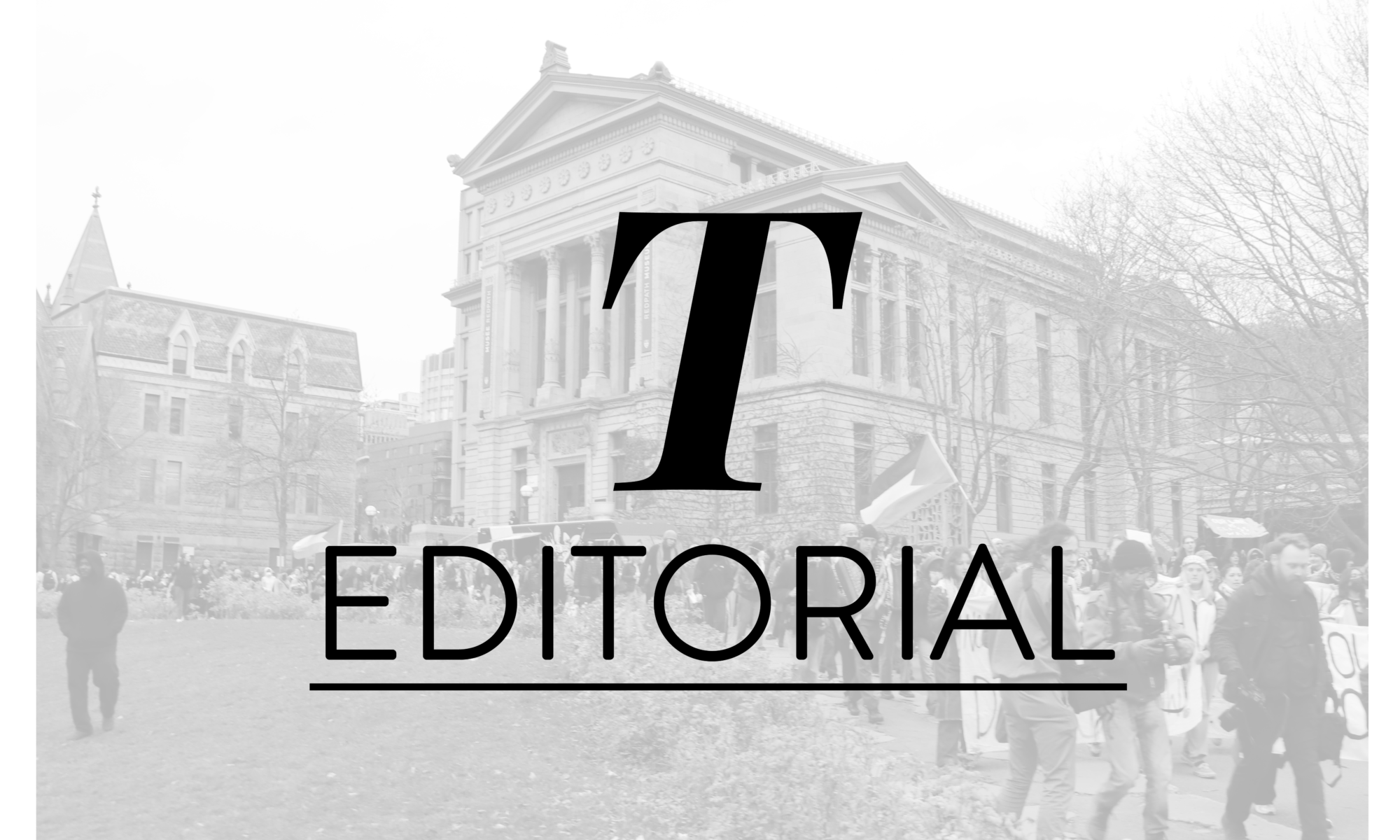The Tribune’s Editorial Board presents its endorsements for the Students’ Society of McGill University (SSMU) Fall 2023 referendum questions. The Tribune’s editors researched and discussed each of the questions before voting on each endorsement. The endorsements reflect a majority vote of the editorial board, with editors who have conflicts of interest abstaining from pertinent questions.
MUSTBUS Fee Increase: Yes
MUSTBUS is a student-run co-op bus service created in 2019 that offers cheap bus tickets to McGill students. Round-trip tickets currently cost approximately $30 for a day trip and $60 for an overnight trip. In Winter 2023, MUSTBUS ran over 20 trips to destinations, including Boston, Toronto, Ottawa, and New York City. MUSTBUS is asking to increase the opt-outable fee for its services by $3—from $2 to $5. This will allow the company to meet inflation and to offer more bus trips, more destinations, and lower costs for customers. MUSTBUS’ main issue has been being unable to meet the student demand, with tickets for trips selling out within minutes. The Tribune endorses the $3 fee increase, as it is opt-outable and demand for MUSTBUS’ services has been displayed.
Creation of the Student Nutrition Accessibility Club Fee: Yes
The creation of the Student Nutrition Accessibility Club (SNAC) fee will support the club starting in Fall 2024 and lasting until the end of Winter 2029. The club’s services include weekly distributions of free, fresh produce and monthly educational nutrition workshops. The club is currently supported by the McGill Sustainability Projects Fund, which provided $15,260 to its initiatives for Fall 2023. The fee, which students can opt out of, is $1.30 per semester and will not only allow SNAC to continue bringing its services to McGill students, but also increase the club’s capacity to distribute free produce and expand the number and scope of the educational programs. Due to the prevalence of food insecurity on campus and the lack of affordable options, The Tribune supports the creation of this fee and the expansion of SNAC’s services.
Safety Services Fee Increase: Yes
Safety Services offers a variety of valuable services on the McGill campus, including the McGill Student Emergency Response Team (MSERT), the Sexual Assault Centre of the McGill Students’ Society, and both the DriveSafe and WALKSAFE programs. Each of these services picks up the slack in the critical area of student safety, helping to support, protect, and care for students where the McGill administration has fallen short. The fee increase proposed in this question, which raises the non-opt-outable fee from $5.65 to $7.01 per semester, would affect the funding for only MSERT. It would allow them to continue offering their free First Aid courses, the current funding for which expires this semester. It would also enable them to expand their offerings of free courses and workshops for the general public, as well as to purchase critically-needed new training equipment and training courses for their volunteer emergency responders.
Base Fee Increase: Yes, with reservations
SSMU is asking for an increase to the SSMU base fee—the mandatory fee that all SSMU members pay. This fee is used to support the Society’s everyday operations, including funding over 250 clubs, services such as the SSMU Eating Disorder Center and the Sexual Assault Center, and the SSMU office. The base fee, which was last increased in 2019, is currently $68.48 per semester for most full-time undergraduate students and, if this motion passes, will increase by 71 per cent to $117.21.
According to the motion initiating the fee, the increase would be used to raise wages for unionized staff and to help the Society meet unprecedented levels of inflation. In an email to The Tribune, SSMU explained that this year’s executive team decided to pause growth and put a hiring freeze in place at the beginning of their term to combat the current financial situation, which has forced the society to dip into reserve funds in recent years. Without a fee increase, SSMU says that it would “likely have to drastically reduce its operational scale,” thus impacting the services and programs available to students. The Society has also stated that it plans to use the additional funds to help mobilize against the Quebec government’s proposed tuition hikes through campaigning and student outreach.
While paying workers proper wages, maintaining services for students, and ensuring the financial sustainability of the students’ union is vital, SSMU should be more forthcoming about how this $48.73 increase will be spent if the motion passes. SSMU members, like SSMU employees, are under unprecedented pressure from tuition hikes, inflation, high housing costs, and food insecurity, and they deserve a detailed breakdown of where the additional revenue from this fee increase would go. Further, SSMU has been plagued by low student engagement for years; if this fee passes, it is imperative that SSMU dedicate substantial resources to increasing student outreach and engagement so that SSMU members know the tools available to them through their students’ union and how to engage in student democracy. Overall, The Tribune endorses a vote of “Yes” for this non-opt-outable fee, as living wages for SSMU employees and the resources SSMU provides are vital, but cautions that SSMU must do better to be transparent and increase student engagement.
Radio CKUT Fee Increase: Yes
CKUT is a non-profit community radio station based at McGill which provides 24/7 programming. It is one of the only places on campus where students can get access to high-quality sound equipment and studios to learn broadcast journalism and radio skills. The Tribune sees value in supporting other campus media outlets in order to foster a healthy student democracy—particularly amid Bill C-18. CKUT’s programming platforms institutionally-neglected voices and reports on the undercurrents of the arts and news of Montreal. The station is requesting a $2 raise to their semesterly opt-outable fee, bringing the fee for most full-time students from $5 to $7. Given the burden of inflation and the fact that they have not requested a fee increase since 2012, The Tribune advocates for a “Yes” vote for a CKUT fee increase.
First Year Fee Renewal: Yes
SSMU’s First Year Council is an elected body that represents first years, advocates for them, and aims to help them adjust to university life. It also holds events, such as mixers, giveaways, and therapy dog hangouts. The Tribune sees helping new students get acclimated and learn how to engage in campus democracy as crucial. That being said, the paper encourages careful spending of the funds collected from this fee. If passed, SSMU must ensure that first year students are being brought events that help them learn about mental health resources on campus, know their rights, socialize, and engage with campus democracy. As such, The Tribune endorses a “Yes” vote on this $0.50 opt-outable fee.
Creation of the Community Solidarity Fund, Fee, and Solidarity Funding Committee: Yes
The Tribune votes “Yes” on establishing a $1 opt-outable fee to finance a Community Solidarity Fund, which would be overseen by a Solidarity Funding Committee. This initiative stands to increase the amount of funding available to social-justice-focused initiatives whose aims align with SSMU’s positions. It also would be more accessible than other types of funding, which often require that recipients have organizational bank accounts or a larger organization willing to accept funds on their behalf. The policy has built-in safeguards: Recipients will have to write a report detailing what they used the funds for within three months of receiving the money, and no one individual or group will be able to receive over 7.5 per cent of the overall fund in a given year. Consultations were conducted with SSMU’s Funding Commissioner, SSMU’s Indigenous Affairs Commissioner, SSMU’s Equity Commissioners, the SSMU Vice President (VP) Student Life, the SSMU VP Sustainability and Operations, and the Quebec Public Interest Research Group at McGill. Given the importance of supporting social justice projects and the thorough research that went into the proposal of this fee, The Tribune supports the establishment of the Community Solidarity Fund.
Ratification of the Board of Directors Members: Yes
Section 6.5 of the SSMU Constitution stipulates that SSMU’s Board of Directors, its highest governing body, must be ratified through either a General Assembly or a referendum. As per the Constitution, “The Board of Directors shall supervise the management and administer the business and affairs of the Society and shall exercise all of the powers of the Society, except for those which the Act expressly reserves to the Members.” This vote would officially make Alexandre Ashkir, Nadia Dakdouki, Lalia Katchelewa, Liam Gaither, and Jacob Shannon members of the SSMU Board of Directors from November 15, 2023 until November 14, 2024. The Tribune urges a “Yes” vote so that SSMU’s Board of Directors can carry out its role.
Policy Against Genocide in Palestine Referendum Question: Yes
The Tribune strongly endorses a “Yes” vote on the adoption of the Policy Against Genocide in Palestine. This policy seeks to confront the lacking and insensitive responses of McGill University toward supporting Palestinian students and redressing settler colonialism here and abroad. The Tribune recognizes this policy as a testament to Palestinian students, groups, and allies courageously organizing for self-determination and for an anticolonial world in line with previous popular mobilizations and the relentless work of Black and African students at McGill to cut ties with South African apartheid. In voting for this policy, the university can acknowledge and build on the multiracial, multireligious, and pluralist movement for peace that Palestinian, Arab, Jewish, and Muslim students have forwarded.
McGill has invested and collaborated with donors, institutions, and corporations actively complicit in Israel’s settler colonial apartheid. As it stands, McGill’s investments, collaborations, and words enact violence on Palestinian students, and help erase Palestinian families, land, and struggle abroad. The policy asks McGill to cut ties and divest from violent stakeholders. These include investments in arms and weapons manufacturers and contractors that develop technologies that kill Palestinians—$500,000 in Lockheed Martin and $1.6 million in Thales—and investments in killing our planet, with $1.4 million in Chevron, Israel’s main fossil fuel extractor. McGill also holds partnerships with universities, such as Tel Aviv University, which funds military research for Israel, and the Hebrew University of Jerusalem, whose strategic location in Israeli-occupied East Jerusalem has allowed the university to house a military base. McGill cannot call for “compassion, inclusivity, and respect” without divesting and disavowing these institutions.
On campus, the policy asks McGill to condemn the Israeli bombing and genocide, retract threats to Palestinian students and groups, and provide concrete support to Palestinian and Arab students. The policy calls on SSMU to release a public statement, provide support for Palestinian and Arab students, and commit to a consistent, solidaristic position against genocide and settler colonial apartheid with Palestinian students and the Palestinian struggle for liberation. These should be the expectations for a university and the individuals who represent all students’ interests. The Tribune endorses a “Yes” vote because it is the first step toward repairing McGill’s outsized role in silencing Palestinian students and pro-Palestine movements and in sustaining settler colonial apartheid.









